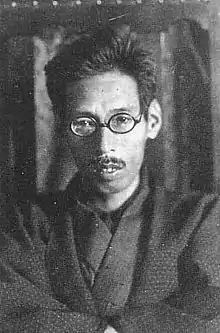Haruo Sato | |
|---|---|
 | |
| Born | 9 April 1892 Shingū, Wakayama, Japan |
| Died | 6 May 1964 (aged 72) Tokyo, Japan |
| Occupation | Writer |
| Genre | Novel, poem |
| Literary movement | Aestheticism |
Haruo Sato (佐藤 春夫, Satō Haruo, 9 April 1892 – 6 May 1964) was a Japanese novelist and poet active during the Taishō[1] and Shōwa periods of Japan.[2] His works are known for their explorations of melancholy.[3] He won the 4th Yomiuri Prize.[4]
Selected works
- The House of a Spanish Dog, 西班牙犬の家, 1914.
- Melancholy in the Country, 田園の憂鬱, 1919.
References
- ↑ Yuko Kikuchi (2007). Refracted Modernity: Visual Culture and Identity in Colonial Taiwan. University of Hawaii Press. pp. 26–29. ISBN 978-0-8248-3050-2.
- ↑ Susan Napier (28 December 1995). The Fantastic in Modern Japanese Literature: The Subversion of Modernity. Taylor & Francis. pp. 242–. ISBN 978-0-203-97463-6.
- ↑ "Haruo Sato's lush, gloomy landscapes," by Eugene Thacker, Japan Times, 4 Jun. 2016.
- ↑ "読売文学賞" [Yomiuri Prize for Literature] (in Japanese). Yomiuri Shimbun. Retrieved 26 September 2018.
External links
- Works by Haruo Sato at Project Gutenberg
- Works by or about Haruo Satō at Internet Archive
- 新宮市立佐藤春夫記念館 – Shingu City Sato Haruo Memorial Museum
This article is issued from Wikipedia. The text is licensed under Creative Commons - Attribution - Sharealike. Additional terms may apply for the media files.